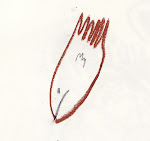One passage, translated from Spanish to English reads:
Jadeo, viscoso aleteo. Bueco, voceo, clamoreo por el descampado. Vaya malachanza. Esta vez te vacio la panza, te tuerzo, te retuerzo, te volteo y voltibocabajeo, te rompo el pico, te refriego el hocico, te arrranco el pito, te hundo el esternon. Broncabroncabron.
I flap, gooey, I flutter, I dive, I cry, I sigh for space. Joke unjoke. I pummel your plexus, I twist you, retwist you, I whirl you and twirl you, facedownfalling, I smash your pout. I flatten your snout, I smack your back, I crack your croak. Jokeyjokeyjoke.
(translated by Eliot Weinberger)
I underestimate the job, and the power of a translator. In his book "The Following Story", Cees Nootboom (as the narrator, Herman Mussert, who wakes up one night in a foreign city and recalls his life up to this moment) talks about his favourite student in the Latin class he teaches in Amsterdam. He remembers her translations as the most enjoyable ones to read because "she would sometimes add details entirely of her own invention". She would bring her character as "she entered the very soul of the language". It is interesting to think about the individual interpretation of a piece of text when translating it. I had never really considered the grey area between languages, especially when veering an ancient language into the modern world. How much can it be upturned, examined and played with?
In music - rescoring can add such different weight to a piece. In the mid 1950s Benjamin Britten made a visit to Indonesia, (fueling his growing interest in the music from the far east) and on his return transcribed Balinese gamelan music for Colin Mcphee on solo piano. Without the energy and percussive jarring of the gamelan orchestra, the immensely celebratory music becomes so poignant. The notes are the same but the two pieces could not be more different. One is so alive, you can almost feel the rhythm. In the other, the piano resonates from a lonely room. (Both are beautiful.) What can be said about relocating music that has been specifically written, or more so is the outcome of living within a certain culture, in a certain environment, at a certain time? It is amazing to realise the elasticity, the versatility of what is essentially a series of notes.
Gambangan - Dancers of Bali: Gamelan of Peliatan
Gambangan - Benjamin Britten, Colin Mcphee : Britten and the Far East

No comments:
Post a Comment